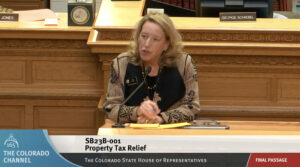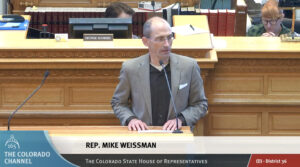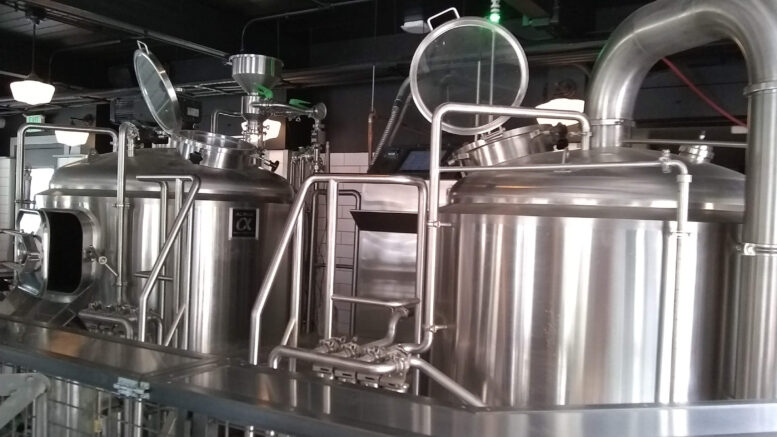Few employers are taking advantage of a business personal property tax credit enacted by Colorado five years ago, leading legislators to consider whether they should simplify the credit or just kill it and look to provide companies tax relief in another way.
Business owners can seek the credit on as much as $18,000 of the annually taxed business personal property that they own — including equipment, machinery, security systems and furnishings but not real property like land and commercial buildings. The way that the credit is calculated, the average owner of $100,000 in business personal property in the state would receive a tax credit of $444 a year.
In income tax year 2021, for which taxes were paid in 2022, just 425 taxpayers claimed the business personal property tax credit, according to Colorado Department of Revenue data — less than 1% of business personal property taxpayers in the state. That netted business across Colorado a total savings of about $170,000.
A report from the Colorado Office of the State Auditor attributed the low uptake on the credit to several reasons. Many taxpayers and certified public accountants appear to be unaware of its existence. A decent number of people who claimed the credit did so incorrectly and couldn’t receive it. And far more people took advantage of a three-year-old exemption that allows any owner with no more than $52,000 in business personal property to be exempt from paying any taxes at all.
Business personal property tax exemption more popular
That exemption — passed into law as part of a 2021 bill that also eliminated a number of targeted business tax breaks — paid out $16.7 million in benefits in 2021, the year it boosted the previous exemption threshold from $7,700 in business personal property. Rep. Mike Weissman, the Aurora Democrat who co-sponsored the enacting law, estimated about two-thirds of Colorado businesses now are exempt from paying the hated BPPT.
Members of the Legislative Oversight Committee Concerning Tax Policy who met Thursday concurred with the auditor’s report that questioned whether the BPPT tax credit, passed four years before the exemption expansion, should be replaced or repealed. Rather than move forward with just rescinding the credit, though, they will take the next several weeks to debate one of two other ways its tax-cutting purpose can be obtained.

Colorado state Rep. Lisa Frizzel criticizes a property-tax-cut bill during a 2023 special session for not doing enough to help business.
One solution offered by Rep. Lisa Frizell, R-Castle Rock, is to expand the exemption amount, either by raising the threshold or by allowing all businesses to exempt the first $52,000 in business personal property that they own from their tax calculations. A primary argument for the latter idea, the auditor’s report noted, is that a business with $52,001 in personal property loses the exemption entirely rather than a portion of the exemption.
The problem, however, is that the auditor’s office calculated that allowing every business to take the $52,000 exemption — an exemption whose values grows with inflation — would reduce property-tax revenues to local governments by $127.4 million. Those governments, some of whom rely on property-tax collections as a primary revenue source, already are worried about the impact of two property-tax ballot initiatives that Gov. Jared Polis is so worried about that he called a special session to scuttle them.
A delicate environment for property-tax cuts
Normally, business leaders, who once pushed for consideration of a phase-out of business personal property taxes, would back expanding the $52,000 exemption to all businesses, said Meghan Dollar, senior vice president of governmental affairs for the Colorado Chamber of Commerce. However, that’s not realistic in the current environment, she acknowledged to the oversight committee.
“As an organization, we fully recognize where we are in the property-tax conversation,” Dollar said.
So, Frizell instead asked staffers to draw up a bill that would eliminate the underused tax credit and grow the exemption threshold to a higher level. That could be $75,000 or $100,000 or something in between, she said, but it would acknowledge that businesses continue to struggle under the burden of rising property-tax bills — also a reason for the coming special session — and look to help them.
“I do think it’s very important that we take care of our business community,” Frizell said, pointing to Colorado dropping from No. 11 to No. 16 in CNBC’s Top States for Business rankings last month while placing in the bottom half of all states for business friendliness. “I think it’s important that we really work to pay some attention to our business community and listen to what their pain points are. And business personal property taxes are really a pain point to our small businesses.”
Another business personal property tax solution

Colorado state Rep. Mike Weissman speaks on the House floor in May 2023.
Weissman agreed to sign onto that bill if it gets support from the oversight committee at its September meeting. But he also asked staffers to draft a second bill that takes a slightly different approach to the tax.
To preserve the tax credit but make it easier for businesses to file, he would like to offer a similarly sized credit to all businesses that must file taxes on their personal property. That would mean that rather than going through the step of calculating what they owe and how much their credit would be based on that total, a taxpayer could just file for the credit and let the state calculate what every business would get that year.
“The point is to encompass more of the small businesses that are on the wrong side of the cliff effect right now,” he said of companies owning more than $52,000 in business personal property.
Hated tax will be issue in 2025 session
Regardless of which solution advances, it appears there is some bipartisan momentum again to lower business personal property tax bills, which vex employers because they are paying continuing tax on depreciating property that they purchased years before. The tax, which 14 states do not even have, disincentives investment in new capital equipment and, in doing so, inhibits a company’s efforts to grow in this state, business leaders have said.
Colorado, which until last year had never ranked outside the top 10 in the CNBC measurements, now is ranked as having the fifth-highest cost of living in the country (earning it an F) and the 12th-highest cost of doing business (good enough for a D-plus). It’s business friendliness fell from 18th to 32nd this year as employers say that increasing regulations are becoming an obstacle to Colorado growth, and its one-time rankings in the top 10 for workforce, infrastructure and quality of life all fell.
That’s why any effort to reduce business personal property taxes will be a win, Dollar told the oversight committee.
“The more businesses that are able to utilize (a BPPT tax break), the better it is for business and the easier it is for businesses to operate in Colorado,” she said.
